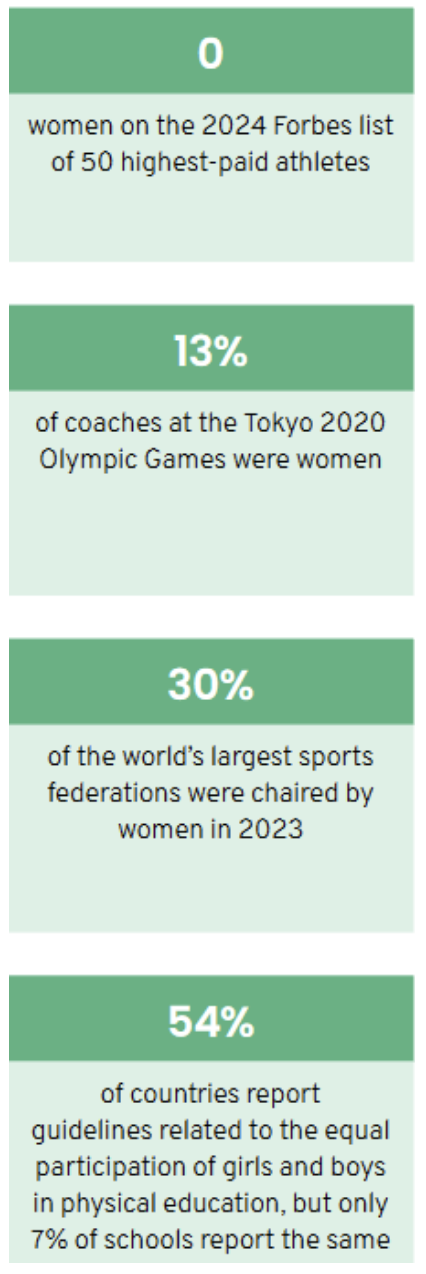News Excerpt:
On the eve of the Olympic Games, a new UNESCO report reveals that women and girls are still far from having equal access to sport at any level, professional or amateur.
More about the UNESCO report:
- UNESCO urgently calls on its 194 Member States to tackle these inequalities by putting in place the recommendations contained in the report.
- The Organization is also bringing together sports ministers from around the world at its Paris headquarters to develop concrete political actions.


What is the Game Plan for Sport and Gender Equality?
- UNESCO’s Sport and Gender Equality Game Plan, published with the support of UN Women and UN Spotlight Initiative, provides decision-makers with tools, resources and good practice examples for realizing gender equality in and through sport.
- Sport is essential to foster individual well-being and healthy, vibrant and sustainable communities.
- Despite considerable advances in recent years, gender inequalities persist in virtually every aspect of sport.
- Through targeted investments, data-informed policies and inclusive programming, sport can become both an equitable ecosystem and a powerful tool to drive girls' and women’s empowerment.
Who is the Game Plan for?
- The Sport and Gender Equality Game Plan has been designed for decision-makers in government and sport organizations who are in charge of formulating policy and/or organizational strategies relating to gender equity.
- It also provides practical guidance which will be useful to sport leaders and administrators, civil servants and policy officers in sport ministries or other sectors wishing to use sport to deliver broader social outcomes, especially those related to empowerment, inclusion and equality.
- UNESCO’s Game Plan identifies and advocates ways to engage diverse groups of actors in all stages of policy design and delivery.
How was the Game Plan developed?
- The Game Plan has been developed by UNESCO, within the framework of its global sport initiative Fit for Life, and with support from members of the Fit for Life Global Alliance and the Group of Friends for Sport and Gender Equality.
- This collaborative effort has ensured a comprehensive scope and alignment with key priorities defined at MINEPS VII, where UNESCO Member States endorsed the Game Plan’s role ‘as a central tool to translate relevant international policy frameworks and initiatives into action’.
|
What is Fit for Life?
How does Fit for Life work?
|
Gender equality in and through sport:
- Gender equality in sport refers to the policies, programmes, activities and conditions that ensure equality between women and girls, men and boys.
- Gender equality through sport refers to the unique power of sport to empower women and girls, challenge gender biases, eradicate gender-based violence and promote systems-level change.
What does the Game Plan include?
- Action planning
- Each chapter provides clear and actionable recommendations for policy-makers and sport leaders to get in the game by developing and implementing policies and programmes that drive gender equality in and through sport.
- Fit for Life resources and initiatives
- Information about Fit for Life’s programmes, partnerships and campaigns highlight ways UNESCO can support countries and organizations to implement the Game Plan’s recommended actions.
- Guidance for collaboration
- Strategies are provided on how to identify and engage with key players within and beyond the sport ecosystem, including athletes, research institutions, civil society organizations and the private sector.
- Spotlights
- Twenty case studies from around the world highlight good practice examples of policies and programmes that advance
- gender equality in and through sport, and that can be adapted for your national or local context.
- Indicators
- A bank of recommended indicators is provided to support data collection and progress measurement on sport and gender equality.
Way Forward:
- Gender inequalities exist throughout the world, in every sport and at all levels of play.
- Addressing these inequalities requires gender-transformative, evidence-based policies and programmes that empower girls and women and strengthen sports systems.
- Decision-makers in government and sport organizations across the world needs to:
- Champion gender equality in sport leadership, governance and decision-making.
- Develop capacity and infrastructure to support gender-equitable sport participation.
- Commit to ending all forms of gender-based violence in sport.
- Harness the power of sport to change attitudes, foster gender equality and empower women and girls.


